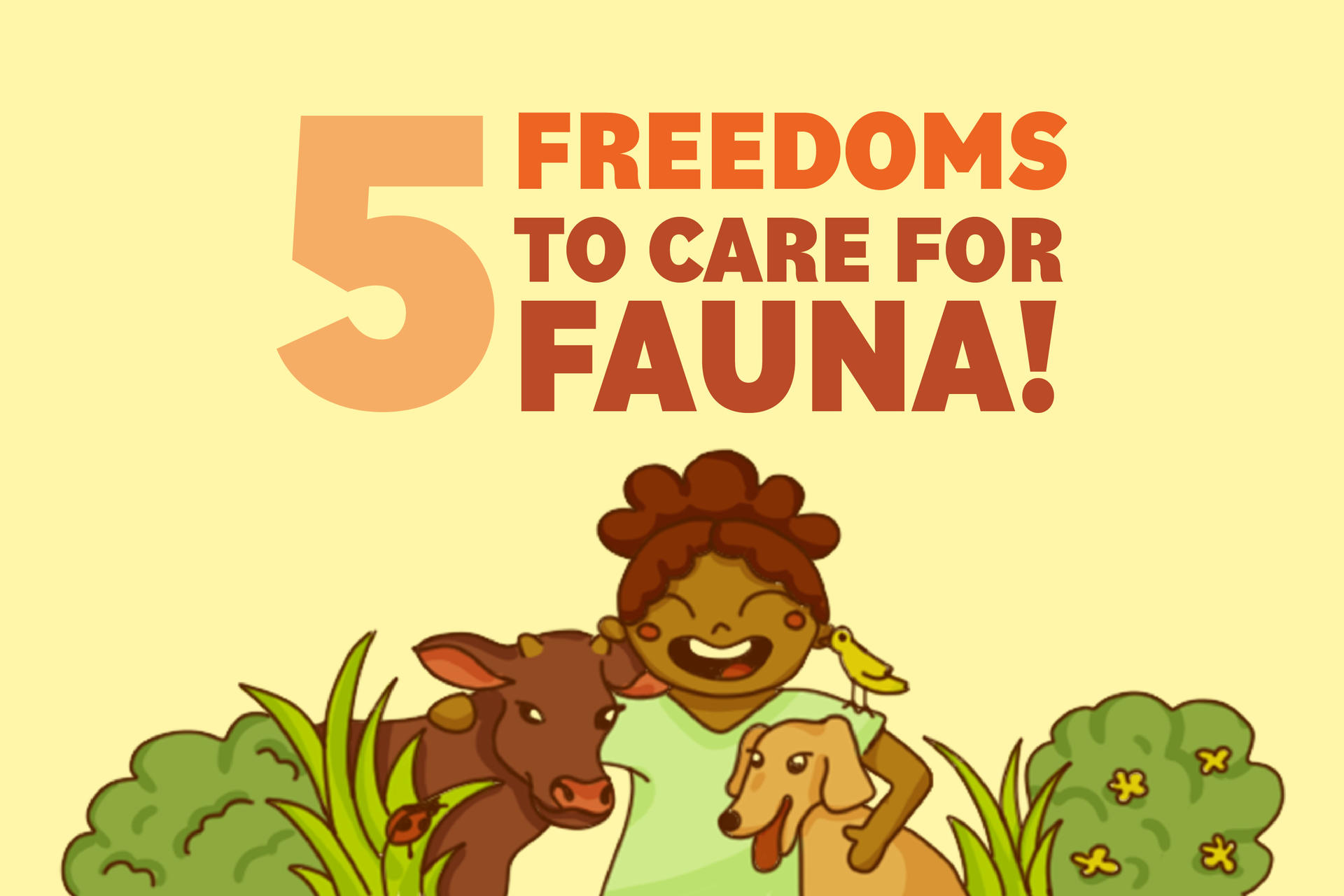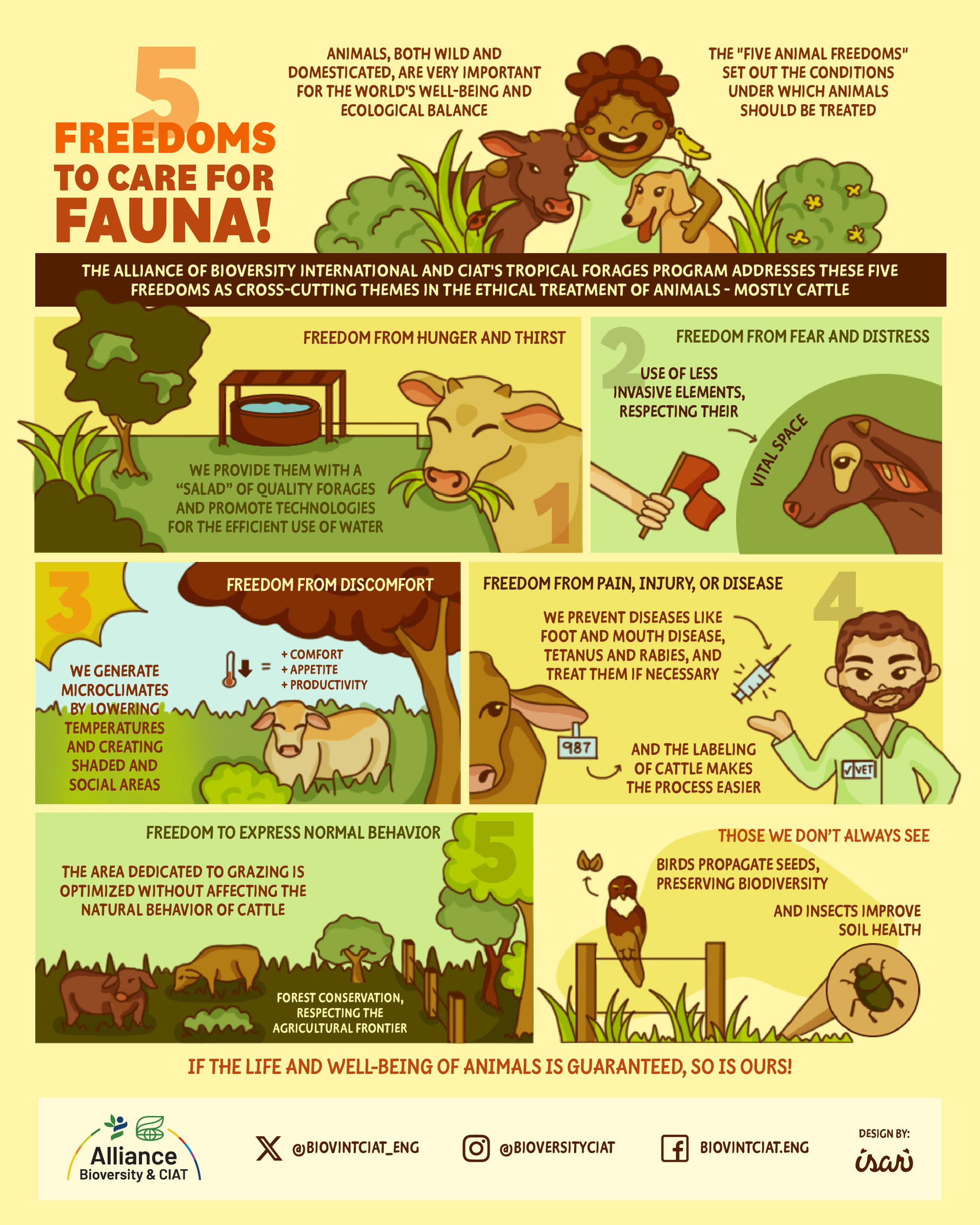Blog Animal Day: Five Freedoms to care the Fauna

By Isabela Rivas
For about 200,000 years, since humans became the dominant species, we have made many transformations to nature in order to survive and evolve. Without getting into the rightness and wrongness of this process, it’s essential to acknowledge that we have a symbiotic relationship with the planet, and that the more we take care of it, the more well-being we will be able to obtain, even securing our own continued existence. This also entails the controlled, sustainable, and friendly use of all the species that coexist with us during our time on Earth, among which are the animals.
Animals, both wild and domestic, play a crucial role in the world's well-being and ecological balance. They provide valuable benefits such as ecosystem conservation, companionship in daily life, and a source of protein and micronutrient for humans. For this and more, animals deserve respect and a dignified life. The Five Animal Freedoms, enunciated in 1965, outline the standards of care and treatment that humans should provide for them, particularly for the domestic ones. At the Tropical Forages Program of the Alliance of Bioversity International and CIAT, these five freedoms are addressed as cross-cutting themes in the ethical treatment of animals, with a particular focus on cattle, which are central to our research and work.
These insatiable ruminants domesticated around 10,000 years ago have reached all latitudes in two major species: Bos indicus (originating from Asia) and Bos taurus (originating from Middle East). They are very interesting animals, with defined habits and behaviors, including hierarchical structures within their groups. In commemoration of the World Animal Day, we want to emphasize the importance of ensuring that the spaces, technologies, and resources used in livestock farming adhere to these five freedoms:
Freedom from hunger and thirst
This freedom is one of the main lines of work of the Tropical Forages Program, since a large part of its research is dedicated to the improvement of pastures’ nutritional quality. Palatability is also important, since cattle also like selecting their food; therefore, we aim to offer a variety of high-quality forages, similar to a "salad" of all possible greens, allowing cattle to choose the food they like best. As for hydration, the Tropical Forages Program promotes water resource efficiency through various hydration technologies such as water harvesting. This method allows rainwater to be collected and stored to later provide the animals with a constant source of water they can access depending on their desires and needs. Additionally, this technology guarantees the conservation of aquatic ecosystems from potential degradation caused by overgrazing and direct consumption by livestock.

Freedom from fear and distress
Traditionally in livestock farming, dogs and horses have been used to move cattle, causing a stressful response in the animals. One way to avoid this is to opt for less invasive methods such as guiding flags, which guide and transport cattle without disturbing their flight zones, which represent the "personal space" of the animals.
Freedom from discomfort
Similar to humans, animals are influenced by climatic conditions. Under extreme situations, their water requirements increase, their appetite diminishes, resulting in weight loss, and they may experience heightened stress levels, leading to decreased production performance. One of the measures to respect this freedom are silvopastoral systems, which generate microclimates by lowering temperatures and creating shaded areas where cattle usually take refuge during intense sunlight hours. Currently, additional studies are being carried out on shaded grazing with pastures adapted to these conditions, and preliminary results indicate that under shade, cattle reduce their water consumption by up to 30%. This reduction is an indicator not only of greater well-being but also of more efficient water use.
Freedom from pain, injury, or disease
Every livestock production system must ensure timely vaccination of its animals to protect against diseases such as brucellosis, foot and mouth disease, tetanus, and rabies. The vaccination schedule should be followed as recommended, for example, in Colombia, this must be done every six months. In addition, proper control and identification of livestock facilitate early detection and treatment of illnesses by a veterinarian. It is also necessary to control insects, especially flies, as they can cause stress and disease transmission.
Freedom to express normal behavior
There is a boundary between domestication and the restriction of an animal’s nature. While extensive grazing is traditionally practiced in many parts of Latin America, it can conflict with the amount of land devoted to livestock, especially if deforestation is used to expand the land. Technologies developed to date and promoted by the Alliance of Bioversity IInternational and CIAT aim to sustainably intensify livestock production, moving from 0.7 total livestock units (TLU ―average weight of an adult animal―) per hectare to 4 TLU/ha. This will allow the animals to maintain their natural behavior while optimizing the area used for grazing.
Those we don’t always see
In addition to cattle, there are other animals involved in livestock and other production processes. Birds, for example, are excellent seed distributors, allowing the spread of forest, forage and leguminous species that help maintain livestock and biodiversity. Others, even more overlooked, are the "soil engineers", the macrofauna composed of insects, earthworms, and beetles, which, despite their small size, perform multiple functions in the soil, such as decompressing and aerating it, contributing to the recycling of its nutrients and the fertilization of pastures, and even reducing parasite populations and improving the health of larger species.
In the end, all animal species, regardless of their characteristics, are important to us and contribute to the preservation n of biodiversity as wonderful as we know it.
When the lives and well-being of animals are guaranteed, so are ours!
